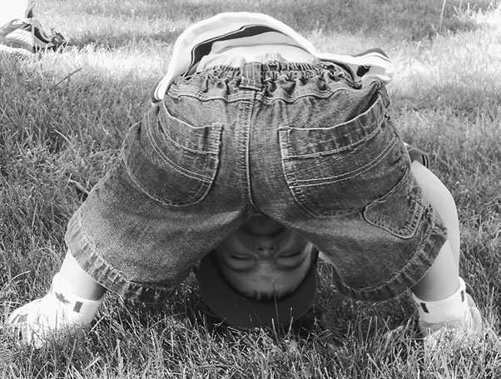The No Cry Discipline Solution (33 page)
Read The No Cry Discipline Solution Online
Authors: Elizabeth Pantley




134
A Peaceful Home: Staying Calm and Avoiding Anger
Lack of Adequate Training
Although parenting is a diffi cult, complex job, it doesn’t come with
clear instructions. Even if you read parenting books or take classes,
every child responds in unique ways and family issues change from
day to day. So no matter how prepared you are, it’s still all on-the-
job training—and the job keeps changing! Because of this, we can
never fully “master” parenting, so we often feel as if we’re chasing
a moving target. Our lack of training for the enormous task can
make us insecure and cause us to feel helpless. When trying to
force things to go the way we think they should, it can lead us to
anger.
Mother-Speak
“ Up until a few months ago, I always had control over every
aspect of Hannah’s life. It was only when she started rebel-
ling that it became clear that she indeed was a separate
human being from me with her own set of ideas, prefer-
ences, and opinions! Today was the fi rst time it hit me that
this shift in behavior and attitude wasn’t just about what she
wanted to wear or her refusing to listen to me, it was about
her starting to be her own person. I think a part of my anger
was that I was no longer able to control ‘all things Hannah.’ It
was me being in denial that she is a totally different person
from me and that she will most likely be a different person
than I expect and want her to be. Looks like someone forgot
to tell me that when they cut that umbilical cord it meant
at some point down the line (two and a half years to be
exact) she would start to become a person I would have
less and less control over—and whom I’d have to trust would
make good choices for herself using the tools that have been
Why Do Parents Get Angry at Their Children?
135
taught to her. That brings tears to my eyes . . . partly because
I see there is a part of me that doesn’t want to believe that
one day she will fl y on her own, when she won’t need me
as much, and partly because I wish I would have recognized
that months ago when my anger and frustration were at its
peak.
“The fi rst half of Hannah’s twos were a piece of cake. I
didn’t understand what the big fuss about the terrible twos
was all about! Not that Hannah was a perfect angel, but still
. . . this second half of the twos has been . . . hmm . . . let’s
say diffi cult and interesting. All of a sudden my sweet little
girl who always did as she was told and never had a tantrum
transformed into a little diva who did what she wanted to do
and that was that! The moving target you mentioned was so
dead-on. I felt like just when I mastered something and got
ahold of a bad behavior, she would change things up and I’d
end up fl ailing! I don’t believe in spanking, but I have come
really close a couple of times, and that really upset me.
“It helps to see the ‘whys’ behind the anger, and it has
made a big difference already. I am able to stop myself
quicker and ask myself where the anger is coming from, and
remind myself of her emerging independence—and that it is
really a good thing.”
—Kia, mother to Hannah, age 2½
Lack of Support
In days past, families were larger, and people tended to stay in the same area their entire lives. Therefore, young parents had
grandparents, aunts, uncles, cousins, siblings, and friends close
by to help them in their new role as parents. When a problem





136
A Peaceful Home: Staying Calm and Avoiding Anger
occurred, there were many people to turn to for help. With today’s
much smaller family units and increased mobility, extended fam-
ily members don’t live close by; they may even live on different
continents. Frequent moves mean that close friendships are harder
to maintain.
In addition, many families are headed by one parent only, giv-
ing that person the responsibility for all parenting and household
duties in addition to the burden of fi nancially supporting the fam-
ily. This lack of support and added pressure opens the door to
much more stress and anger.
Mother-Speak
“ Today’s parents have pressure on them to function as great
parents without the necessary ‘scaffolding’ to do the job.
They lack support, experienced advice, and people just
being there to call on. It can be a lonely and diffi cult job.”
—Jane, mother to Isla, age 5, and Willow, age 3
Frustration, Confusion, and Disappointment
Because of the many pressures we just talked about, things in the
household don’t always go smoothly or according to plan. We can
attempt to use every parenting skill in our repertoire, we can have
well-planned routines, and we can be thoughtful and even wise,
yet we can still end up with children who don’t do what we want
them to do. This can lead us to feel confused and frustrated—
Why
won’t my child behave? Why on earth can’t I get a handle on this?
It can also cause us to be disappointed in our children and in ourselves as parents. All these negative emotions can easily lead to
anger.

